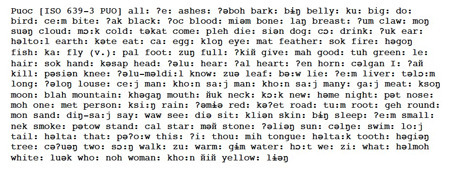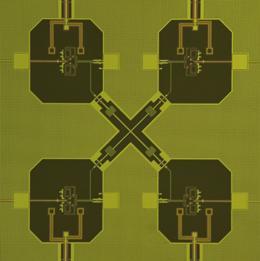Stewart Brand's Blog, page 114
October 10, 2010
Happy 10,000th Jericho
Stewart Dickson sent in this AP story today on Jericho celebrating it's 10,000th anniversary. While I always knew conceptually that Jericho was about 10,000 years old, it is pretty stunning to think of a city actually celebrating that anniversary, even if they didnt really know the date of its founding:
JERICHO, Palestinian Territories — The Palestinians on Sunday marked the 10,000th anniversary of the founding of Jericho, an oasis town in the West Bank that may be the world's oldest city.
The date chosen for the anniversary — 10/10/02010 — was mostly symbolic.
The oasis town near the Dead Sea is one of the oldest cities in the world, with evidence of settlement dating back to 9000 BC and urban fortifications dating back to 7000 BC, predating Egypt's pyramids by 4,000 years. [read on]







October 5, 2010
Futurestates: watch, predict the future
I just happened upon a call for extras (check it out if you're based in San Francisco) for a film that will be part of a series of sci-fi shorts called Futurestates:
What will become of America in five, 25, or even 50 years from today? FUTURESTATES is a series of 11 fictional mini-features exploring possible future scenarios through the lens of today's global realities. Immerse yourself in the visions of these independent prognosticators as they project a future of their own imagining.
A major section of the site is the Predict-o-meter where they align predictions made by the creators of the site, predictions submitted by users, and known upcoming events on a single timeline for browsing:







October 4, 2010
All Species
A decade ago The Long Now Foundation spun off a project called All Species. The goal was to document all the species on the planet in 25 years in an open archive for all. That project was launched amidst the bursting of the dot com bubble, and it did not survive it. It also met a lot of resistance from scientists who did not see the value of freely sharing their data. However several efforts and scientists that were associated with, inspired by, or just happened to be doing the same thing have continued on. Today another decade long effort, the $650 million Census of Marine Life has published its results as public data. And other direct offshoots like E.O. Wilson's Encyclopedia of Life project and the Barcode of Life project march on.
It seems odd to think that we dont know all the species on our planet. If we were to discover life on Saturn's moon Titan for instance, you would think that the first thing we would do would be to catalog it. Yet we are still discovering new species, genus and even families on our planet at a regular rate, even as the number is declining at an even more alarming rate.
We hope that as a generation of new scientists takes hold of academics, ones who grew up with resources like Wikipedia and the Census of Marine Life, that at some point we will have the All Species catalog.







October 2, 2010
The qubits entangle
Nature reports quantum computing researchers achieve "success at entangling three-circuit systems".
"The entanglement of two or more qubits sets up a 'superposition' of states in which calculations can run in parallel — in principle allowing a quantum computer to race through problems that it would take a classical computer eons to solve. Such a quantum machine would require hundreds or even thousands of entangled qubits. The maximum reached so far is 12, but some of the systems that researchers are working with, including those depending on the spins of ions, may be hard to scale up." [read the story]
While this is progress it does not look like we are on teh road to having a commercially available 100 qubit machine by the end of 02010 as predicted on Long Bets:
Looks like this is a good prediction, but just a few years off.







September 30, 2010
Rosetta Disk at the Hammer Museum for an "Enormous Microscopic Evening"
Join Long Now's Rosetta Project on November 4 from 4 – 7 pm at UCLA's Hammer Museum where we team up with San Francisco-based CRITTER for an Enormous Microscopic Evening. We'll put a Rosetta Disk under the microscope, check out the fine (and finer) print, and maybe hunt for Easter eggs… More information on the evening's lineup from the Hammer Museum:
Enormous Microscopic Evening examines the museum from a microscopic perspective with CRITTER, a San Francisco-based salon dedicated to expanding the relationships between culture and the environment. The evening will focus on demonstrations and workshops about building and manipulating microscopes. Materials and samples taken from around the museum will be examined. Continuing the theme of microscopy, there will be micro performances (short concerts with tiny instruments) and other related events throughout the museum.







Lera Boroditsky Ticket Info
The Long Now Foundation's monthly
Seminars About Long-term Thinking
Lera Boroditsky on "How Language Shapes Thought"
TICKETS
Tuesday October 26, 02010 at 7:30pm Cowell Theater
Long Now Members can reserve 2 seats, join today! • General Tickets $10
About this Seminar:
When given a set of images showing the passing of time – for example, a baby maturing into an adult and then becoming an old man – speakers of English will arrange the images from left to right. Speakers of Hebrew will arrange them from right to left. No matter where the experiment is conducted, speakers of certain Australian aboriginal languages arrange the images from East to West, in orientation the daylight path of the sun across the sky.
Do the languages we speak influence the way we think? Is there intrinsic value in human linguistic diversity? Join us as Stanford cognitive linguist Lera Boroditsky re-invigorates this long standing debate with data gathered in experiments with speakers from all over the world.
Twitter - up to the minute info on tickets and events
Long Now Blog – daily updates on events and ideas
Facebook – stay in touch through our fan page
Long Now Meetups - join one or start your own







September 29, 2010
Endangered Language Linguist awarded prestigious MacArthur Fellowship
Jessie Little Joe Baird, a linguist who has worked for years on reviving the Wampanoag (Wôpanâak) Language, has just been awarded a 02010 MacArthur "Genius" Fellowship in honor of her work and research.
Baird, who is of Wamponoag heritage, studied at MIT under the indigenous language scholar Kenneth Hale. By immersing herself in the language, she has achieved fluency, effectively reviving in herself the spoken use of the long-silent language. Her research is focused on developing a dictionary of Wampanoag, which now includes nearly 10,000 words, as well as language teaching resources, through which she hopes to help usher the language into modern use in the Wampanoag community.







September 28, 2010
Be a Pilot Tester for The 300 Languages Project
The 300 Languages Project is a special effort by The Rosetta Project to create a parallel text and audio corpus for the world's 300 most widely-spoken languages. We are seeking a limited set of volunteers to test its submission process and offer feedback to its coordinators before the project is globally launched in November. Native speakers of any language (including English) are encouraged to participate.
To participate, sign up here or email laine@longnow.org.







Long Now Media Update

LISTEN
(downloads tab)
Richard Rhodes's "Twilight of the Bombs"
There is new media available from our monthly series, the Seminars About Long-term Thinking. Stewart Brand's summaries and audio downloads or podcasts of the talks are free to the public; Long Now members can view HD video of the Seminars and comment on them.







September 24, 2010
Swadesh List data now re-enabled in Rosetta Internet Archive Collection

Swadesh list for the Puoc language in the International Phonetic Alphabet
In the 01950s, American linguist Morris Swadesh, as part of his overarching vision of a quantitative method for determining language relationships on a global and multimillenial scale, developed a set of one hundred words found to be unusually stable across time and language boundaries. Swadesh hypothesized that words like "fire," "moon," "mother" and "bone," common to human experience, were far less likely to change...
Stewart Brand's Blog
- Stewart Brand's profile
- 291 followers











